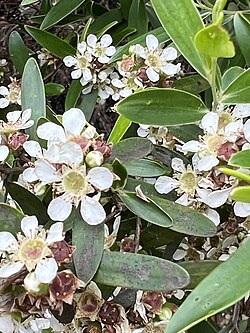Biology:Leptospermum luehmannii
| Leptospermum luehmannii | |
|---|---|

| |
| Growing in the Australian Botanic Garden | |
| Scientific classification | |
| Kingdom: | Plantae |
| Clade: | Tracheophytes |
| Clade: | Angiosperms |
| Clade: | Eudicots |
| Clade: | Rosids |
| Order: | Myrtales |
| Family: | Myrtaceae |
| Genus: | Leptospermum |
| Species: | L. luehmannii
|
| Binomial name | |
| Leptospermum luehmannii | |
| Synonyms[1] | |
| |
Leptospermum luehmannii is a species of shrub or small tree that is endemic to Queensland. It has glossy green elliptic leaves, white flowers and fruit that falls from the plant shortly after the seeds are released.
Description
Leptospermum luehmannii is a shrub or small tree and that typically grows to a height of 5 m (16 ft). It has smooth, reddish brown bark that peels in long strips. The leaves are elliptical, glossy when mature, mostly 15–40 mm (0.59–1.57 in) long and 6–9 mm (0.24–0.35 in) wide on a very short petiole. The flowers are white, 6–12 mm (0.24–0.47 in) wide on a short pedicel and arranged on short shoots on the upper leaf axils. The floral cup is glabrous, 2–3 mm (0.079–0.118 in) long, the sepals blunt triangular 1–1.5 mm (0.039–0.059 in) long, the petals mostly 5–6 mm (0.20–0.24 in) long and the stamens 1–2 mm (0.039–0.079 in) long. Flowering mainly occurs from January to February and the fruit is a capsule 4–5 mm (0.16–0.20 in) wide and that is shed soon after the seeds are released.[2]
Taxonomy and naming
Leptospermum luehmannii was first formally described in 1900 by Frederick Manson Bailey in his book The Queensland Flora. The specific epithet honours J.G.Luehmann.[3][4]
Distribution and habitat
This tea-tree grows on the summit and slopes of the Glass House Mountains and in the Numinbah Valley.[2]
The National Herbarium of New South Wales lists this species as having the common names "ngun ngun may bush", or "hillside wild may bush" and as occurring in New South Wales between Grafton and Glen Innes, although with a note that the "NSW population [is] likely to be taxonomically distinct."[5]
References
- ↑ 1.0 1.1 "Leptospermum luehmannii". Australian Plant Census. https://biodiversity.org.au/nsl/services/apc-format/display/99041. Retrieved 16 April 2020.
- ↑ 2.0 2.1 Thompson, Joy (1989). "A revision of the genus Leptospermum (Myrtaceae)". Telopea 3 (3): 358–359.
- ↑ "Leptospermum luehmannii". APNI. https://id.biodiversity.org.au/instance/apni/525415. Retrieved 15 April 2020.
- ↑ Bailey, Frederick Manson (1900). The Queensland Flora (Volume 2). Brisbane: H.J. Diddams. p. 592. https://www.biodiversitylibrary.org/item/211093#page/294/mode/1up. Retrieved 16 April 2020.
- ↑ "Leptospermum luehmannii". Royal Botanic Garden Sydney. http://plantnet.rbgsyd.nsw.gov.au/cgi-bin/NSWfl.pl?page=nswfl&lvl=sp&name=Leptospermum~luehmannii. Retrieved 16 April 2020.
Wikidata ☰ Q15368460 entry
 |


